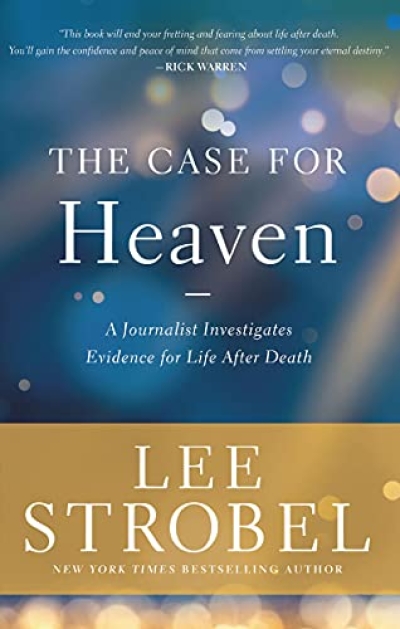Atheist-turned-Christian, Lee Strobel, described as one of the evangelical church’s ‘most popular apologists’, is best known for his investigative-journalist series of books, ‘The Case for Christ’, The ‘Case for a Creator’ and more recently, ‘The Case for Miracles’.
Probing questions
Strobel continues his well-established investigative format and engaging writing style for this study – examining the evidence for the existence of heaven. It’s a topic that attracts enormous interest. For, as the author discovered, humanity holds an insatiable appetite to achieve immortality. Aware that this cannot physically be achieved, many pursue ‘symbolic immortality’ – that is, ways to leave a legacy or make an impact on the world so that at least their memory will be kept alive in perpetuity.
Using his tried and tested method of interview-conversations with choice ‘experts’ in related fields – including a neuroscientist, a Christian philosopher and an influential New Testament scholar – Strobel moves stealthily from one consideration to another, seeking to obtain answers to such probing questions as:
- Are we conscious beyond the grave?
- Can we get even a glimpse into the world beyond?
- Are worldviews other than Christianity (e.g. atheism, pantheism) viable?
- Do traditional teachings on hell make sense?
Near-death experiences
The chapter on near-death experiences is particularly fascinating, not least given that polls show that as many as one-in-ten people across 35 countries claim to have undergone some sort of NDE, and that 40% of patients who survived a cardiac arrest had awareness during the time they were clinically dead and before their hearts were restarted.
One-in-ten people across 35 countries claim to have undergone some sort of NDE.
An interview with John Burke, author of bestseller, Imagine Heaven, is illuminating, ruling out various alternative NDE explanations, and showing that people who’ve gone through a near-death experience are often changed forever. The chapter concludes that “NDEs provide such powerful scientific evidence that it is reasonable to accept the existence of an afterlife” (p.69).
A discussion with American theologian Scott McKnight considers whether there will be pets in heaven, or marriage, or whether rewards will be given; questioning also whether purgatory is biblical, whether Christians should be cremated, and looking at matters related to children who die.
Reincarnation and hell
Chapters 7 and 8 examine (with author Paul Copan) the ‘logic’ of hell, considering also possible alternatives, such as annihilationism and universalism. Annihilationism was tentatively embraced by John Stott and fellow Anglican, John Wenham, while NT professor Bart Ehrman has even suggested that Jesus taught this position. Copan carefully dismisses such notions, as he does universalism, a theory increasingly adopted by ‘progressive’ Christians such as Rob Bell, Brian Maclaren and Steve Chalke, among many others, who find it quite contradictory that a loving God would send countless sinners to eternal, unthinkable torment.
Many 'progressive’ Christians find it quite contradictory that a loving God would send countless sinners to eternal, unthinkable torment.
Strobel’s lengthy discussion with author and researcher Doughlas Groothuis on the topic of reincarnation was, for this reviewer, another personal highlight of ‘The Case for Heaven’. Although many testimonies to the reality of reincarnation appear on the surface to be highly plausible, even probable, Strobel and Groothuis debunk many arguments used to advance them, showing, for example, that hypnosis subjects (the source of many reincarnation anecdotes) “are highly suggestible and frequently seek to tell the hypnotist what they think they want to hear” (p.198). They also explore the possibility of cryptomnesia (when a person takes in information but forgets the source of it), déjà vu, demonic influence, and outright fraud.
Engaging though not exhaustive
But a major flaw runs through this book – also characterising all others in ‘The Case for … ’ series. Strobel’s choice of interviewees is selective, in that he only picks people whose views he already agrees with. While regularly raising the objections of those with contrary points of view, he never interviews them, simply allowing his guests to debunk them instead.
A concluding chapter comprises a personal interview with Luis Palau in his modest Oregon home shortly before his death. Ever inspiring, the then-86-year-old evangelist, who was suffering from stage 4 terminal cancer, relates how, even facing imminent death, his belief in God and in heaven remained unshakeable.
Like Strobel's previous books, ‘The Case for Heaven’ is well-researched and backed up with over 30 pages of references. The book also comes with an extensive Reading Guide for further evidence, a list of ‘favourite verses’ relating to heaven, and a Discussion Guide for group interaction or personal reflection.
A fascinating investigation and a deeply engaging read, this book is clearly not exhaustive. The defect in rigorous journalism notwithstanding, the study does give the reader a huge amount of food for thought, and will hopefully lead to further reading on this significant topic.
'The Case for Heaven' (306pp) is published by Zondervan and is currently on offer from Blackwells for the reduced price of £10.99 (inc p&p).





